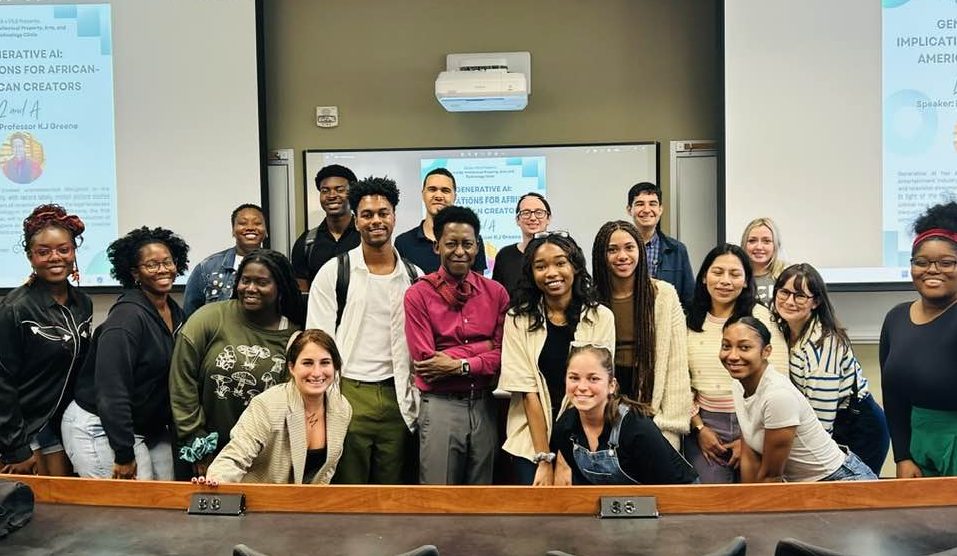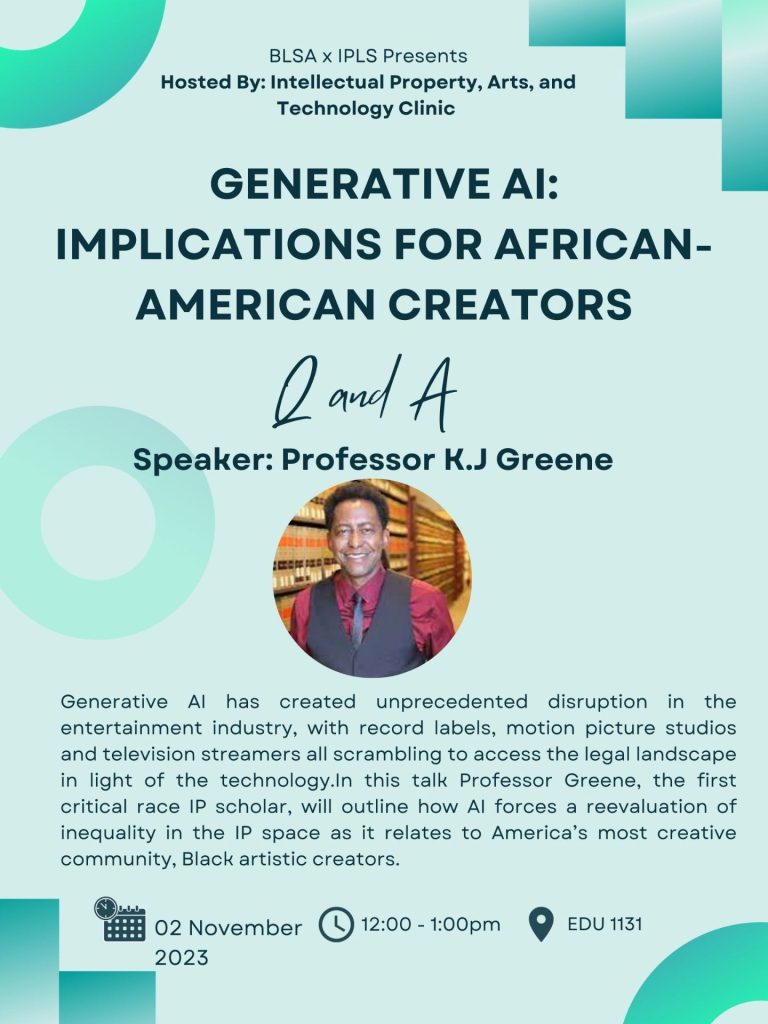
Professor KJ Green (center) with UCI Law students from the Black Law Students Association, Intellectual Property Society, and the IP, Arts, and Tech Clinic
Guest post by Claudia Diaz Martinez and Elizabeth Monroe
Last November, the IPAT Clinic partnered with the UCI Law Black Law Students Association and the Intellectual Property Law Society to host Professor K.J. Greene, the first critical race IP scholar and long-time friend of the Clinic. Professor Greene, the John J. Schumacher Professor of Law at Southwestern Law School, spoke about generative AI and its implications on Black creators. In his talk, he discussed the history of institutionalized racism upon which many of the major players in the entertainment industry today built their empires, and the ways in which generative AI is now creating unprecedented disruption, with record labels, motion picture studios and television streamers all scrambling to access the emerging legal landscape in light of new and continuously evolving technology. Each of his points underscored the ways in which recent innovation in AI is forcing industries to reevaluate inequality in the IP space as it relates to Black artists and creators.
Earlier in the semester, Professor Greene visited the IPAT Clinic as a guest to talk about his personal career path, the intersection of copyright, race, and gender, and how this intersection has and continues to impact Black musicians and other musicians of color. In this conversation, Professor Greene emphasized how the giants of the music industry built their wealth by exploiting Black artists and denying them copyright protection, while simultaneously working to secure copyright protections for the record labels themselves and other major players. Professor Greene showed the ways in which copyright, as a system of protections, often disadvantages Black artists and the many artistic forms and styles that are indigenous or unique to the Black community, such as the improvisation of Black blues and jazz singers or the unique vocal styles and patterns of artists like Little Richard.
S ince its inception nearly ten years ago, the IPAT Clinic’s work has been informed by that of Professor Greene and scholars like him who have exposed the ways in which disenfranchised communities have historically been left out of conversations around, and disadvantaged, by intellectual property policies. Much of the work we do in the Clinic, from our fair use work with documentarians, to the transparency litigation on behalf of our journalist clients, to the trademark work we do with our small business clients, is directed towards undoing some of that harm and making creative expression and intellectual property protections more accessible. In our own work, it has been more than impactful to know that the projects we are working on are rooted in equity.
ince its inception nearly ten years ago, the IPAT Clinic’s work has been informed by that of Professor Greene and scholars like him who have exposed the ways in which disenfranchised communities have historically been left out of conversations around, and disadvantaged, by intellectual property policies. Much of the work we do in the Clinic, from our fair use work with documentarians, to the transparency litigation on behalf of our journalist clients, to the trademark work we do with our small business clients, is directed towards undoing some of that harm and making creative expression and intellectual property protections more accessible. In our own work, it has been more than impactful to know that the projects we are working on are rooted in equity.
In his November 2 talk, Professor Greene extended this conversation to include the ways in which AI is impacting musicians. Of his points, we found his thoughts on record labels attempting to find ways to own and protect specific styles and vocal patterns from AI recreations particularly interesting. Historically, neither style nor vocal patterns have been copyrightable, and as such, Black artists, especially those performing and recording in the 1930s through the 1970s, were often imitated by white artists that record labels were more comfortable marketing to white, or “mainstream,” audiences.
It was also interesting to hear how interest in Professor Greene’s work and scholarship has shifted throughout the years, especially as collective focus increased post-2020 regarding institutionalized racism and the ways in which it continues to permeate every professional field. Professor Greene has been naming and shedding light on the intersection of IP, race, and gender since the 1990s, often to audiences who did not want to acknowledge the importance of this conversation. It is encouraging to know that the tides are finally shifting and to see the immense current interest in his work.
We are lucky to call Professor Greene a “Friend of IPAT,” and we look forward to welcoming him back to the IPAT Clinic to workshop his scholarship with us.